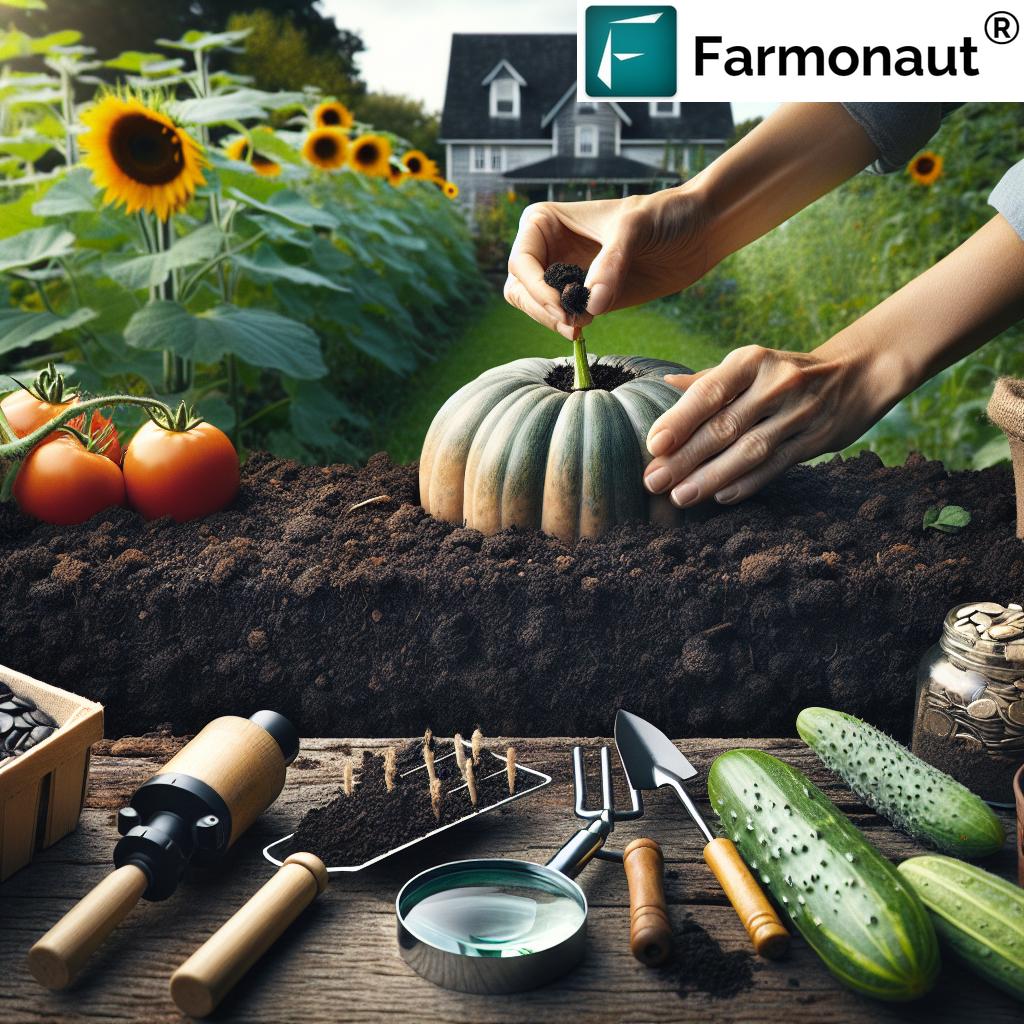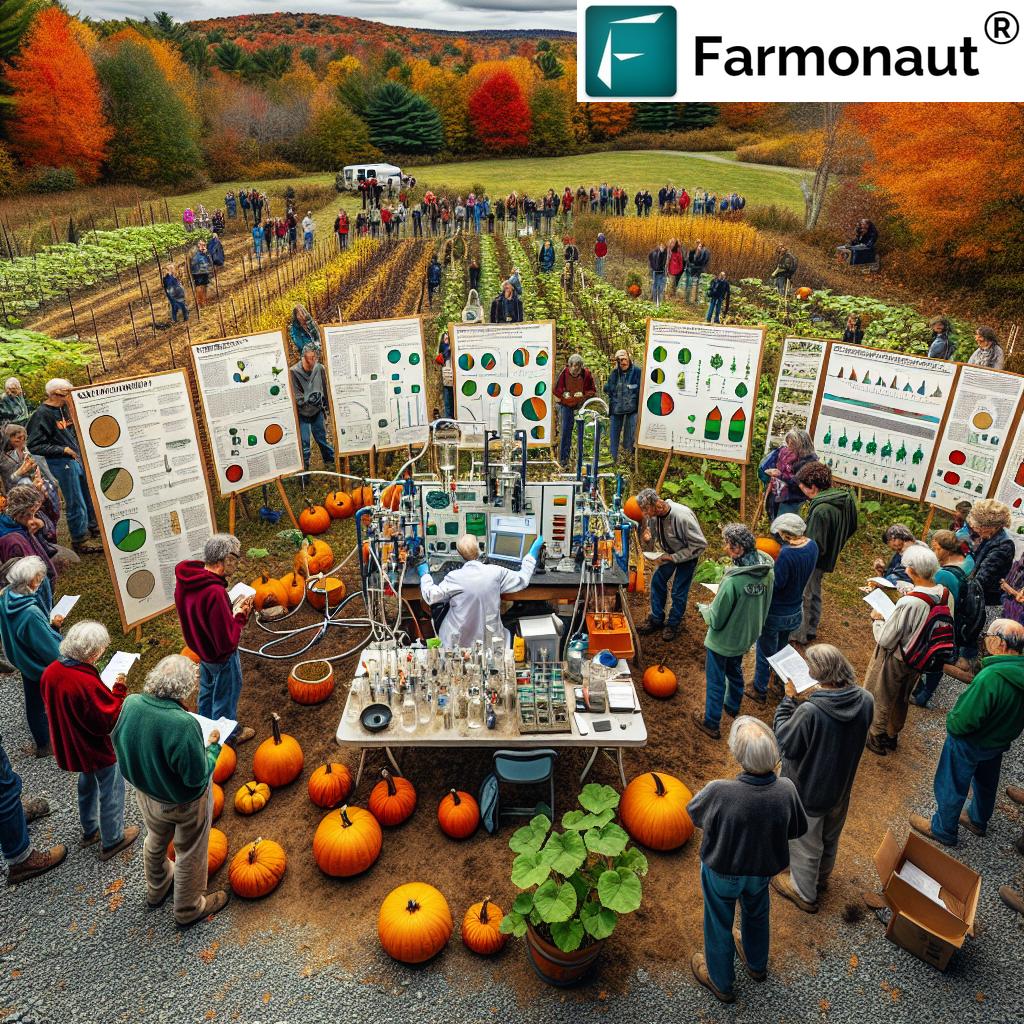Unlock Giant Pumpkin Growing Secrets: Soil Health Workshop in New England for Better Garden Yields
“New England soil health workshops cover 3 locations: Fitchburg, Groton, and Lancaster, offering hands-on experiences in soil management.”
Welcome, fellow gardening enthusiasts! Are you ready to embark on an exciting journey into the world of giant pumpkin growing and soil health? We’re thrilled to bring you this comprehensive guide on unlocking the secrets to cultivating massive pumpkins and improving your overall garden yields. Whether you’re a seasoned gardener or just starting out, this blog post will provide you with valuable insights and practical tips to enhance your green thumb.
In this article, we’ll explore the fascinating realm of soil health, fertility, and microbiology, and how these factors play a crucial role in growing not just giant pumpkins, but also in improving the overall health and productivity of your garden. We’ll delve into the upcoming soil health workshops in New England, featuring expert guidance from Scott Lehto, a competitive grower and local soil-health expert.
The Magic of Soil Health in Giant Pumpkin Growing
Before we dive into the workshop details, let’s understand why soil health is so critical for growing giant pumpkins and other garden plants.
- Nutrient-rich foundation: Healthy soil provides essential nutrients for robust plant growth
- Microbial ecosystem: Beneficial microorganisms in the soil support plant health and nutrient uptake
- Water retention: Well-structured soil helps retain moisture, crucial for pumpkin development
- Root development: Healthy soil promotes strong root systems, essential for supporting large fruits
Understanding and improving your soil’s health is the first step towards growing record-breaking pumpkins and achieving better yields in your entire garden.

New England Soil Health Workshops: A Golden Opportunity
Now, let’s explore the exciting workshop series that will take place in various locations across New England. These workshops offer a unique opportunity to learn from experts and gain hands-on experience in soil management and giant pumpkin cultivation.
| Date | Location | Topic | Key Takeaways |
|---|---|---|---|
| April 12, 2023 | Groton Public Library, 99 Main St., Groton | Giant Pumpkin Growing and Secrets of Soil Health | Soil fertility, microbiology basics, technology in gardening |
| April 19, 2023 | Thayer Memorial Library, 717 Main St., Lancaster | Soil Testing and Analysis for Better Gardening | Hands-on soil testing, interpreting results, improving soil health |
| May 11, 2023 | New England Botanic Garden at Tower Hill, 11 French Drive, Boylston | Growing Giant Pumpkins Workshop | Seed preparation, transplanting seedlings, soil chemistry deep dive |
These workshops promise to be invaluable for anyone interested in improving their gardening skills, whether you’re aiming to grow giant pumpkins or simply want to enhance your overall garden productivity.
Meet the Expert: Scott Lehto
Scott Lehto, our workshop leader, brings a wealth of knowledge and experience to these sessions. As a Senior Scientist at Comprehensive Environmental Inc., Scott specializes in giant pumpkins, squash, tomatoes, and sunflowers. His expertise extends to soil microbiology, chemistry, and fertility management, which he combines with hands-on experience in competitive growing.
Scott’s passion for soil health and its role in successful farming is evident in his approach. He’s eager to share his knowledge and inspire others to explore the fascinating world of soil science. With his guidance, you’ll gain insights that can transform your gardening practices.
Giant Pumpkin Growing Techniques: Not Just for Pumpkins
“Giant pumpkin growing techniques can be applied to various plants, including tomatoes and roses, for improved garden yields.”
One of the most exciting aspects of these workshops is learning how the principles of giant pumpkin growing can be applied to other plants in your garden. Whether you’re cultivating cucumbers, roses, or tomatoes, the soil health and fertility management techniques you’ll learn can significantly improve your overall garden yields.
- Soil preparation: Learn how to create the perfect growing medium for various plants
- Nutrient management: Understand the specific nutritional needs of different garden plants
- Pest and disease control: Discover organic methods to protect your plants
- Watering techniques: Master the art of efficient irrigation for optimal growth
By applying these principles, you can transform your entire garden into a thriving ecosystem of healthy, productive plants.
The Science Behind Soil Health
Understanding the science of soil health is crucial for successful gardening. Let’s delve into some key aspects that will be covered in the workshops:
Soil Microbiology
The hidden world beneath our feet is teeming with life. Beneficial microorganisms play a vital role in soil health and plant growth. These tiny helpers break down organic matter, fix nitrogen, and even protect plants from pathogens. In the workshops, you’ll learn how to nurture these beneficial microbes and create a thriving soil ecosystem.
Soil Chemistry
The chemical composition of your soil greatly influences plant growth. pH levels, nutrient availability, and organic matter content all play crucial roles. Scott will guide you through the intricacies of soil chemistry, helping you understand how to balance these elements for optimal plant growth.
Fertility Management
Proper fertility management is key to growing giant pumpkins and improving overall garden yields. You’ll learn about macro and micronutrients, organic fertilizers, and how to create custom fertility plans for your specific garden needs.
For those interested in advanced soil analysis techniques, Farmonaut’s satellite-based crop health monitoring can provide valuable insights into vegetation health and soil moisture levels, complementing the hands-on methods you’ll learn in the workshops.

Hands-On Learning: Soil Testing and Analysis
One of the highlights of these workshops is the opportunity for hands-on learning. Attendees are encouraged to bring small soil samples from their gardens for live analysis using Scott’s microscope. This practical experience will help you:
- Identify soil composition and structure
- Spot beneficial microorganisms
- Detect potential soil health issues
- Learn how to interpret soil test results
This hands-on approach will give you the skills to continually assess and improve your soil health at home.
From Seed to Giant: The Pumpkin Growing Process
The “Growing Giant Pumpkins Workshop” on May 11th at the New England Botanic Garden will take you through the entire process of growing these magnificent fruits. Here’s a sneak peek at what you’ll learn:
Seed Selection and Preparation
Choosing the right seeds is crucial for growing giant pumpkins. You’ll learn about:
- Selecting seeds with proven genetics
- Proper seed storage techniques
- Seed preparation methods for optimal germination
Transplanting Seedlings
The workshop will provide hands-on experience in transplanting pumpkin seedlings. You’ll discover:
- The ideal time for transplanting
- Proper planting techniques
- Early care for young pumpkin plants
Vine Management
As your pumpkin plants grow, proper vine management becomes crucial. Learn about:
- Training vines for optimal growth
- Pruning techniques to focus energy on the main fruit
- Protecting vines from pests and diseases
Fruit Care
Once your pumpkins start growing, they’ll need special attention. The workshop will cover:
- Positioning growing pumpkins for maximum size
- Protecting fruits from sun damage and pests
- Monitoring and managing fruit development
For those interested in tracking their pumpkin’s growth and overall farm management, Farmonaut’s large-scale farm management tools can be a valuable resource, offering real-time insights and data-driven recommendations.
Beyond Pumpkins: Applying Soil Health Principles to Your Entire Garden
While the workshops focus on giant pumpkin growing, the principles you’ll learn can be applied to improve the health and productivity of your entire garden. Here’s how:
Vegetable Gardens
Apply soil health principles to boost your vegetable yields:
- Rotate crops to maintain soil fertility
- Use cover crops to improve soil structure
- Implement companion planting for natural pest control
Flower Gardens
Create stunning flower displays with healthy soil:
- Adjust soil pH for specific flower varieties
- Use organic mulches to suppress weeds and retain moisture
- Incorporate beneficial microorganisms for stronger root systems
Fruit Trees and Berries
Improve your orchard’s productivity:
- Manage soil fertility for optimal fruit production
- Implement proper drainage techniques
- Use mycorrhizal fungi to enhance nutrient uptake
Technology in Modern Gardening
While the workshops focus on traditional gardening techniques, it’s worth noting how modern technology can complement these methods. For instance, Farmonaut’s crop plantation and forest advisory services use satellite imagery and AI to provide valuable insights for large-scale farming operations. While not directly applicable to home gardening, understanding these technologies can broaden your perspective on modern agricultural practices.
Sustainable Gardening Practices
The workshops will also touch on sustainable gardening practices that not only benefit your plants but also the environment. These include:
- Composting and organic waste management
- Water conservation techniques
- Natural pest control methods
- Reducing chemical inputs
By implementing these practices, you’ll create a more eco-friendly garden that supports local biodiversity while producing healthy, bountiful crops.
Networking and Community Building
One of the often-overlooked benefits of attending these workshops is the opportunity to connect with fellow gardening enthusiasts. You’ll have the chance to:
- Share experiences and tips with other gardeners
- Build a network of local gardening friends
- Learn about local gardening clubs and organizations
- Discover community gardening initiatives in your area
These connections can provide ongoing support and inspiration long after the workshops have ended.
FAQs
Q: Do I need to have experience in giant pumpkin growing to attend these workshops?
A: No, these workshops are designed for gardeners of all levels, from beginners to experienced growers.
Q: Will the techniques learned be applicable to small home gardens?
A: Absolutely! The soil health principles can be applied to gardens of any size.
Q: Is there a fee for attending the workshops?
A: Please check with the hosting libraries and botanical garden for any potential fees or registration requirements.
Q: Can I bring my own soil samples for analysis?
A: Yes, attendees are encouraged to bring small soil samples for live analysis, time permitting.
Q: Will there be resources available for continued learning after the workshops?
A: Yes, Scott Lehto typically provides handouts and recommendations for further reading and resources.
Conclusion: Your Journey to Garden Success Begins Here
The New England soil health workshops offer an incredible opportunity to unlock the secrets of giant pumpkin growing and improve your overall gardening skills. By understanding soil health, fertility, and microbiology, you’ll be well-equipped to create a thriving garden that produces bountiful harvests and stunning blooms.
Whether you’re dreaming of growing a record-breaking pumpkin or simply want to enhance your home garden’s productivity, these workshops provide the knowledge and hands-on experience you need to succeed. Don’t miss this chance to learn from experts, connect with fellow gardeners, and take your gardening skills to the next level.
Remember, great gardens start with healthy soil. By investing time in understanding and improving your soil, you’re laying the foundation for years of gardening success. So mark your calendars, bring your curiosity, and get ready to unlock the full potential of your garden!
Happy gardening, and may your pumpkins grow giant and your gardens flourish!
Earn With Farmonaut: Affiliate Program
Earn 20% recurring commission with Farmonaut’s affiliate program by sharing your promo code and helping farmers save 10%. Onboard 10 Elite farmers monthly to earn a minimum of $148,000 annually—start now and grow your income!







